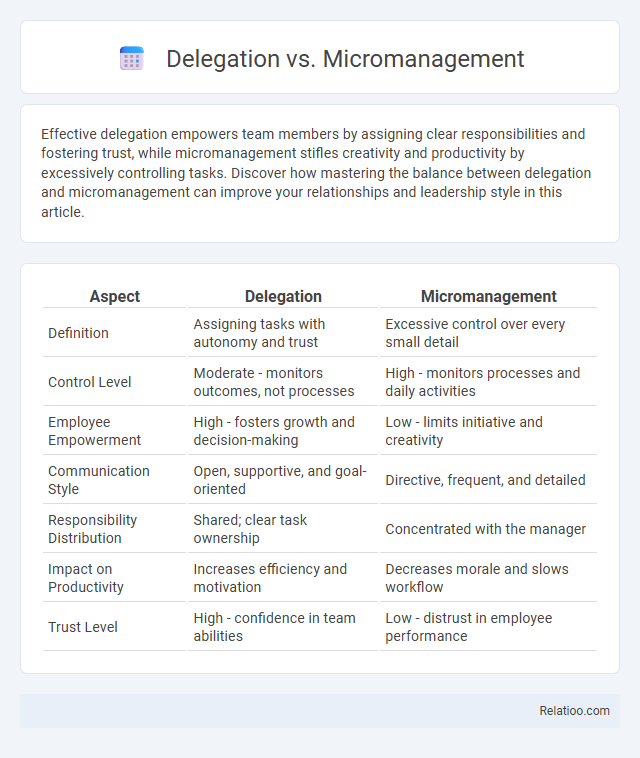Effective delegation empowers team members by assigning clear responsibilities and fostering trust, while micromanagement stifles creativity and productivity by excessively controlling tasks. Discover how mastering the balance between delegation and micromanagement can improve your relationships and leadership style in this article.
Table of Comparison
| Aspect | Delegation | Micromanagement |
|---|---|---|
| Definition | Assigning tasks with autonomy and trust | Excessive control over every small detail |
| Control Level | Moderate - monitors outcomes, not processes | High - monitors processes and daily activities |
| Employee Empowerment | High - fosters growth and decision-making | Low - limits initiative and creativity |
| Communication Style | Open, supportive, and goal-oriented | Directive, frequent, and detailed |
| Responsibility Distribution | Shared; clear task ownership | Concentrated with the manager |
| Impact on Productivity | Increases efficiency and motivation | Decreases morale and slows workflow |
| Trust Level | High - confidence in team abilities | Low - distrust in employee performance |
Understanding Delegation and Micromanagement
Understanding delegation involves assigning responsibility and authority to team members while maintaining accountability, which fosters trust and improves productivity. Micromanagement occurs when a leader excessively controls or monitors tasks, undermining employee autonomy and decreasing motivation. You can enhance team performance by balancing clear delegation with appropriate oversight without slipping into micromanagement.
Key Differences Between Delegation and Micromanagement
Effective delegation empowers your team by assigning tasks with clear expectations and autonomy, fostering trust and productivity. Micromanagement involves excessive oversight and control, often leading to decreased employee morale and inhibited creativity. The key difference lies in delegation's focus on outcomes and responsibility, whereas micromanagement fixates on controlling processes and minute details.
The Benefits of Effective Delegation
Effective delegation enhances team productivity by empowering employees with responsibility and decision-making authority, fostering trust and accountability. It reduces managerial burnout and improves focus on strategic tasks, leading to better resource allocation and project outcomes. Unlike micromanagement, delegation boosts employee morale and development by encouraging autonomy and skill growth.
The Drawbacks of Micromanagement
Micromanagement often leads to reduced employee motivation and creativity, as constant oversight stifles autonomy and trust in the workplace. This management style increases stress levels and burnout, negatively impacting productivity and job satisfaction. Effective delegation, by contrast, empowers employees and fosters professional growth, which micromanagement consistently undermines through excessive control.
Impact on Team Productivity and Morale
Delegation empowers your team by distributing tasks based on individual strengths, significantly boosting productivity and morale through increased trust and autonomy. Micromanagement stifles creativity and motivation, often leading to decreased efficiency and higher stress levels within the team. Balancing delegation with appropriate oversight ensures accountability while fostering a positive work environment that drives sustained team success.
Signs You May Be Micromanaging
Micromanaging often manifests through constant oversight, lack of trust in your team's decisions, and excessive involvement in minor details that hinder productivity. If you find yourself frequently correcting work or not allowing your team the autonomy to complete tasks, these are clear signs of micromanagement. Recognizing these behaviors helps you shift toward effective delegation, empowering your team and improving overall efficiency.
Steps to Transition from Micromanaging to Delegating
Identify key tasks suitable for delegation by assessing team members' skills and capacity. Establish clear expectations and provide necessary resources to empower autonomy while maintaining accountability. Foster regular feedback loops to support progress without exerting excessive control, enabling a gradual shift from micromanagement to effective delegation.
Building Trust Through Delegation
Building trust through delegation requires empowering team members with clear responsibilities and autonomy, fostering confidence in their abilities. Unlike micromanagement, which undermines trust by overcontrolling tasks and stifling initiative, effective delegation promotes accountability and professional growth. Transparent communication and consistent support during delegation cultivate a collaborative environment where trust flourishes and productivity improves.
Common Delegation Mistakes to Avoid
Common delegation mistakes to avoid include unclear communication of tasks, which can lead to confusion and unmet expectations. Micromanagement undermines trust and reduces team productivity by limiting autonomy and stifling innovation. To enhance your leadership effectiveness, focus on assigning responsibilities clearly and providing support without controlling every detail.
Choosing the Right Leadership Style for Success
Effective leadership requires choosing the right style between delegation, micromanagement, and empowerment based on team dynamics and project needs. Delegation fosters autonomy and trust, enhancing productivity and employee growth, while micromanagement can stifle creativity and reduce morale by limiting employee independence. Balancing these approaches ensures clear accountability and supports success by aligning leadership tactics with organizational goals and individual capabilities.

Infographic: Delegation vs Micromanagement
 relatioo.com
relatioo.com